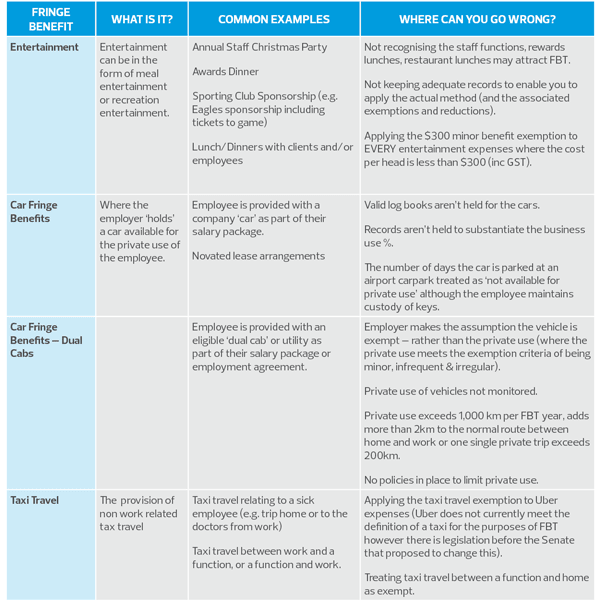With most employers now using Single Touch Payroll (STP), the Australian Taxation Office (ATO) has access to real-time information about employers and their employees.
If you have employees, the more likely it is you are providing some form of fringe benefit and the higher the expectation the ATO will expect to see you lodge an FBT return.
With the end of the 2020 Fringe Benefits Tax (FBT) year fast approaching and taking into account the ATO’s increased access to information about employees, now is the time to undertake a review of FBT and the benefits you may be providing.
At RSM common fringe benefits we see employers providing to employees and where employers go wrong are highlighted below.
Other common fringe benefits employers are encouraged to review are:
- Car parking fringe benefits.
- Living away from home fringe benefits (particularly for fly in fly out employees).
- Remote area housing fringe benefits (tip: the payment of an employee’s mortgage repayments in a remote area will not be exempt, however the reimbursement of their mortgage interest may be eligible for a 50% reduction).
- Expense payment reimbursements.
- Loans to employees.
Keep in mind this list does not cover all possible fringe benefits and the fact you may be providing something not on the list does not mean you aren’t providing a fringe benefit to your employees. FBT is complex and will be dependent on facts, it may not even be clear you are providing a fringe benefit.
Tips for preparing for the end of the FBT year
If you haven’t started the process already now is the time to:
- Check if you are providing fringe benefits to employees;
- Check that you have appropriate policies and procedures in place.
- Obtain copies of log books – if the log book is 4 years old or no longer reflects the private use of the vehicle, ask the employee to complete a new one.
- Where you provide dual cabs and are relying on PCG 2018/3, obtain declarations from employees that their private use falls within the criteria in the PCG. You may also want to put checks and balances in place to ensure the private use does fall within the criteria.
- Check your accounting records to ensure you have the required information to apply relevant exemptions or reductions;
- Obtain supporting documentation (invoices, bank statements etc) from employees in respect of expenses reimbursed (e.g. for meal entertainment, a description of the function, the number of people who attended, the names of who attended, whether they were an employee/associate/spouse/client);
- Obtain required FBT declarations from employees (e.g. no private use declaration, loan fringe benefits declaration, living away from home declarations, relocation transport declarations).
What’s new & what’s hot?
TAXI V UBER
- In 2019, Treasury introduced legislation to change the definition of ‘taxi’ for the purposes of FBT so that it would extend to ride share vehicles such as Uber, Didi and Ola. The legislation, if passed, will apply from 1 April 2019. The legislation has been passed by the House of Representatives but is still to be debated by the Senate and will not become law until it has been passed by both Houses and receives Royal Assent.
CRYPTOCURRENCY
- The ATO have warned employers that if an employee receives cryptocurrency as remuneration instead of salary & wages in Australian dollars, the payment may be a fringe benefit.
CAR PARKING FRINGE BENEFITS
- The ATO have announced the implementation date for the Commissioner’s controversial change in view on what constitutes a commercial car parking station for the purposes of FBT (set out in TR 2019/D5) will be delayed from 1 April 2020 to 1 April 2021. The delay in implementation date recognised employers will require time to implement the changes once the ruling is finalised (which may be close to or after 1 April 2020).
If you are unsure if you are providing fringe benefits to your employees or you need assistance in preparing your FBT returns, contact your local RSM office where an advisor can assist with your specific requirements.






